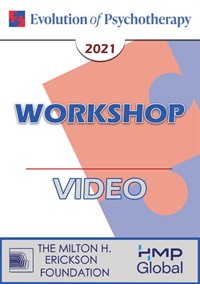
- Average Rating:
- Not yet rated
- Topic Areas:
- Workshops
- Categories:
- Evolution of Psychotherapy | Evolution of Psychotherapy 2021
- Faculty:
- Robert Neimeyer
- Course Levels:
- Master Degree or Higher in Health-Related Field
- Duration:
- 2 hours
- Format:
- Audio and Video
- Original Program Date:
- Dec 05, 2021
- Short Description:
- When grief becomes painfully preoccupying and protracted, the problem often arises at the intersection of the death and the relationship it interrupted. Drawing on attachment-informed and Two-Track models of bereavement, we will begin by considering grieving as a process of reconstructing rather than relinquishing our bonds with those who have died, and the complicating circumstances that can interfere with this natural process. We then turn to a close analysis of a single session of therapy that releases an adult daughter from an anguishing grief that has persisted unchanged for many years, and that has insinuated itself into her life with intimate others. We begin this work by attending closely to "quality terms" in the client's narrative that poignantly convey the character of her connection with her mother, that symbolically signal the devastation caused by her death, and that function as harbingers of a more hopeful reconstructed relationship
- Price:
- $59.00 - Base Price
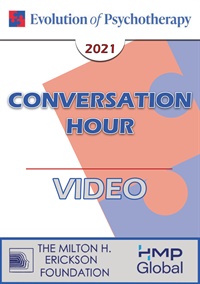
- Average Rating:
- Not yet rated
- Topic Areas:
- Conversation Hours
- Categories:
- Evolution of Psychotherapy | Evolution of Psychotherapy 2021
- Faculty:
- Michele Weiner-Davis, LCSW
- Course Levels:
- Master Degree or Higher in Health-Related Field
- Duration:
- 1 hour
- Format:
- Audio and Video
- Original Program Date:
- Dec 05, 2021
- Short Description:
- Michele will discuss the most recent developments in her work with couples on the brink and field questions from attendees.
- Price:
- $59.00 - Base Price
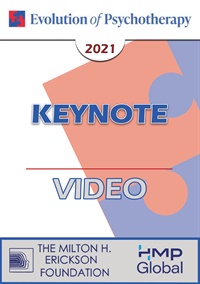
- Average Rating:
- Not yet rated
- Topic Areas:
- Keynotes | Therapist Development
- Categories:
- Evolution of Psychotherapy | Evolution of Psychotherapy 2021
- Faculty:
- Diane Ackerman, MFA, PhD
- Course Levels:
- Master Degree or Higher in Health-Related Field
- Duration:
- 1 hour
- Format:
- Audio and Video
- Original Program Date:
- Dec 05, 2021
- Short Description:
- Most of us feel reasonably intact and continuous, despite the constant commotion in our lives, our relationships, and our cells. But what exactly is a "Self?" In this talk I'll explore how the brain becomes the mind, and how it builds a sense of self (even a secret society of selves), to manage the everchanging mental fantasia in which we spend our days.
- Price:
- $59.00 - Base Price
Tags: Therapist Development
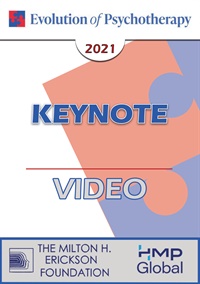
- Average Rating:
- Not yet rated
- Topic Areas:
- Keynotes | Positive Psychology | Psychology
- Categories:
- Evolution of Psychotherapy | Evolution of Psychotherapy 2021
- Faculty:
- Martin Seligman, PhD
- Course Levels:
- Master Degree or Higher in Health-Related Field
- Duration:
- 1 hour
- Format:
- Audio and Video
- Original Program Date:
- Dec 04, 2021
- Short Description:
- Well Being remains, in spite of Covid’s interruption, a plausible personal, corporate and planetary goal. I review the Age of Progress until Covid along with the barriers to continued progress. The belief in individual and collective Agency will determine our future. Efficacy, Optimism, and Imagination, the three parts of agency can be taught in the clinic, the classroom, and the corporation. Juliana of Norwich (1365) will be our beacon.
- Price:
- $59.00 - Base Price
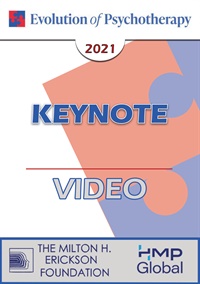
- Average Rating:
- Not yet rated
- Topic Areas:
- Keynotes | Multicultural
- Categories:
- Evolution of Psychotherapy | Evolution of Psychotherapy 2021
- Faculty:
- Derald Wing Sue, PhD
- Course Levels:
- Master Degree or Higher in Health-Related Field
- Duration:
- 1 hour
- Format:
- Audio and Video
- Original Program Date:
- Dec 04, 2021
- Short Description:
- "Sometime between the years 2030 and 2050 Black, Indigenous and People of Color (BIPOC) will become a numerical majority in society. It will become increasingly difficult for mental health professionals, and educators not to encounter clients and students who differ from them in terms of race, ethnicity and culture. Difficult dialogues on race and other sociodemographic identities (gender, sexual orientation or identity) have often served to polarize and obstruct mutual understanding rather than to clarify and increase mutual understanding. Most well intentioned people (mental health providers, educators and others) find themselves ill prepared to deal with the often-explosive race or gender related emotions that manifest themselves in interpersonal interactions and in employment and other public spaces.
- Price:
- $59.00 - Base Price
Tags: Multi-Cultural
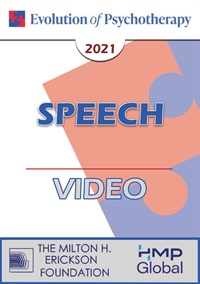
- Average Rating:
- Not yet rated
- Topic Areas:
- Abuse | Speeches | Psychotherapy
- Categories:
- Evolution of Psychotherapy | Evolution of Psychotherapy 2021
- Faculty:
- Claudia Black, PhD
- Course Levels:
- Master Degree or Higher in Health-Related Field
- Duration:
- 1 hour
- Format:
- Audio and Video
- Original Program Date:
- Dec 04, 2021
- Short Description:
- After a detailed description of emotional abandonment, Claudia will discuss a variety of behavioral responses to the internalized shame. The need for control, perfectionism, procrastination, the dynamics of victimization and compartmentalized depression are many such examples that she will describe.
- Price:
- $59.00 - Base Price
Tags: Abuse Psychotherapy
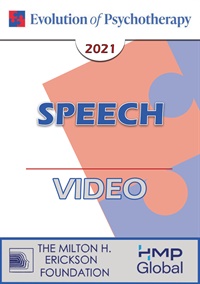
- Average Rating:
- Not yet rated
- Topic Areas:
- Feedback Informed Treatment (FIT) | Psychotherapy | Speeches | Therapist Development
- Categories:
- Evolution of Psychotherapy | Evolution of Psychotherapy 2021
- Faculty:
- Scott Miller, PhD
- Course Levels:
- Master Degree or Higher in Health-Related Field
- Duration:
- 1 hour
- Format:
- Audio and Video
- Original Program Date:
- Dec 04, 2021
- Short Description:
- What can mental health professionals do to enhance their performance? Available evidence makes clear that attending a typical continuing education workshop, specializing in the treatment of a particular problem, or learning a new treatment model does little to improve effectiveness. In fact, studies to date indicate clinical effectiveness actually declines with time and experience in the field. The key to improved performance is engaging in deliberate practice. At this workshop, the latest research on deliberate practice will be translated into concrete steps all clinicians can immediately apply in their efforts to achieve better results.
- Price:
- $59.00 - Base Price
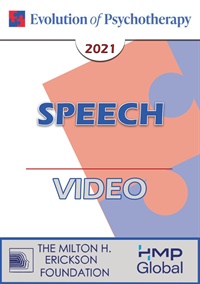
- Average Rating:
- Not yet rated
- Topic Areas:
- Psychotherapy | Speeches
- Categories:
- Evolution of Psychotherapy | Evolution of Psychotherapy 2021
- Faculty:
- Michael Miller
- Course Levels:
- Master Degree or Higher in Health-Related Field
- Duration:
- 1 hour
- Format:
- Audio and Video
- Original Program Date:
- Dec 04, 2021
- Short Description:
- Gestalt therapy envisions a radical conception of the self as temporal and emergent. This means it is a fluid self, continually changing through creative adjustment to its changing contacts with the world. One could think of the self in Gestalt therapy as an unending aesthetic project: Like all experience, it has to be made and remade as it navigates the passing of time. And it is reflexive, being both creator and created.
- Price:
- $59.00 - Base Price
Tags: Psychotherapy
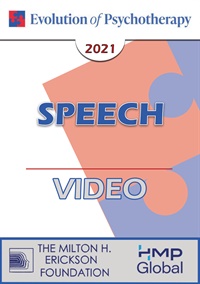
- Average Rating:
- Not yet rated
- Topic Areas:
- Speeches
- Categories:
- Evolution of Psychotherapy 2021 | Evolution of Psychotherapy
- Faculty:
- Steven Hayes
- Course Levels:
- Master Degree or Higher in Health-Related Field
- Duration:
- 1 hour
- Format:
- Audio and Video
- Original Program Date:
- Dec 04, 2021
- Short Description:
- In this talk, Dr. Steven Hayes will claim that most key psychological concepts that have entered into our cultural mainstream contain within them a core conceptual and methodological flaw that makes application of these concepts inappropriate and invalid. Dr. Hayes will explain the error and show how it limits the good that psychology can do for the world. He will then examine a small number of areas of research where significant progress has been made by correcting the problem.
- Price:
- $59.00 - Base Price
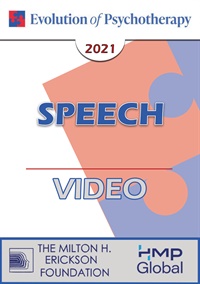
- Average Rating:
- Not yet rated
- Topic Areas:
- Speeches
- Categories:
- Evolution of Psychotherapy | Evolution of Psychotherapy 2021
- Faculty:
- Jean Shinoda Bolen
- Course Levels:
- Master Degree or Higher in Health-Related Field
- Duration:
- 1 hour
- Format:
- Audio and Video
- Original Program Date:
- Dec 04, 2021
- Short Description:
- First half of life is about adaptation to gender and social norms and expectations at which a person succeeds or fails. Midlife raises the question: is this all there is? What now? What next/ A time for questions about the meaning and purpose of life, about responses to suffering and loss, creative expression, spiritual insights.
- Price:
- $59.00 - Base Price
Please wait ...

